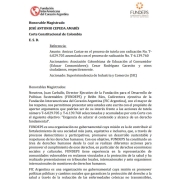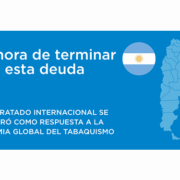Presentation of a report to the UN Human Rights Council
The report focuses on health protection in the face of the tobacco epidemic and urges the UPR (Universal Periodic Review) Committee to recommend that the Argentine State adopt measures to achieve higher standards of protection.
“Below, we offer a google translate version of the original article in Spanish. This translation may not be accurate but serves as a general presentation of the article. For more accurate information, please switch to the Spanish version of the website. In addition, feel free to directly contact in English the person mentioned at the bottom of this article with regards to this topic”
ARGENTINA. This year, the second five-year evaluation carried out by the United Nations Human Rights Council will take place in our country. It provides States with the opportunity to state what measures they have taken to improve the human rights situation and to establish obligations in this regard.
One of the reports, presented by FUNDEPS, together with FIC Argentina, O ‘Neill Institute for National and Global Health Law and FEIM, analyzes the smoking in the world, the marketing of the industry and the legal situation in the country.
Tobacco advertising has a strong influence on smokers and non-smokers: a third of initial experimentation in young people occurs as a result of advertisements. 78% of 13- to 15-year-olds report regular exposure to cigarette commercials around the world.
The reality is that there is a lack of controls, non-compliance with laws and a refusal to ratify the Framework Convention on Tobacco Control (FCTC), an instrument that places obligations on States to adopt Control and establishes a series of effective measures against the consequences of direct and indirect consumption. The treaty was ratified by more than 180 participants and Argentina is the only South American country that is not yet a member of this convention.
The state spends 33 billion pesos every year to treat health problems due to smoking. The tax collection from the sale of cigarettes barely covers two-thirds of the direct costs that the cigarette causes in the health system.
The partial restrictions of the ads encourage the manipulation of the same and generates a legal vacuum. Only through regulations that ensure a complete ban on all direct and indirect forms of advertising can lead our country to reach its goals in terms of cigarette consumption. Current laws lack many of the most significant components of the FCTC and hamper the efforts of health institutions to reduce tobacco use in the territory.
From Fundeps we urge that the Argentine State take this opportunity to take the necessary measures to ensure compliance with fundamental rights.
Source
Institute of Clinical and Health Effectiveness
Author
Federico Piccioni
Contact
Agustina Mozzoni <agustinamozzoni@fundeps.org>








